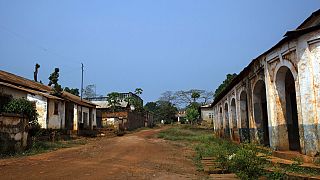climate change
In April 2025, a herd of animals will travel from Central Africa to the northern tip of Norway - drawing attention to climate change.
Forced out of their natural habitats due to global warming, they will be displaced and traversed through cities and urban environments to meet the people there.
But they won't be real animals - they are puppets.
This project is from the team behind The Walk in 2021, where a 12-foot tall puppet of a refugee girl called Little Amal drew attention to the refugee crisis by traveling to 15 countries - from Turkey to the U.K., Ukraine, Mexico and the U.S.
The Herds will be a much bigger and more complicated project.
Along the route, animals native to the countries they are traveling through will join the group, meaning that by the time they get to Norway, they will have assembled around 150 animal puppets.
Amir Nizar Zuabi, who also worked on The Walk, is the artistic director of the project.
"I don't know if what we add to the conversation will change the world. Most probably it won't. Doesn't matter. It's worth trying. But the idea of creating a project that deals with climate change from an emotional stance, from a sensory experience and not from, 'This is the science."
"Because I think we know. I think the problem is not lack of knowledge. I think the problem is we know so much we're becoming desperate. We're becoming defeated. But we need a good reminder of how beautiful nature is," he explained.
And while the herd of puppets won't set off on the 20,000km (12,427 mile) route until next spring, the teams behind the project are busy now working on the logistics of this series of traveling theatrical events.
Students at Wimbledon College of Art (part of University of the Arts London) have been helping to construct the first animals in recycled materials like metal and cardboard.
The blueprint for the puppets come from a South African firm called Ukwanda Puppets and Designs Art Collective.
Then students put the patterns into practise and implement improvements along the way.
"We try to keep it as, like, environmentally friendly as possible. Obviously, it's an environmental kind of statement that they're working with," says Annika Randle, a second year student of Technical Arts for Theatre and Screen.
"It's been really interesting to use cardboard as material, and trying to find ways to strengthen it that still keeps it within its kind of recyclable image."
After that it's time for the puppeteer and performance arts students to learn how to move the animals.
At Thursday's launch they demonstrated early members of the herd in a local park.
"If you look at real gazelles, they really kick their legs back as they jump. So we kind of allowed us to kind of fold them up as they jump and then settle them back in. You know, the puppet acted really nicely, like the real thing," said Oscar Reynolds, who has just completed his studies for a degree in Contemporary Theatre and Performance.
Everything they discover in this workshop period will be used to teach people how to make the puppets and move them, in each country they go to, where they pick up more animals.
Zuabi is also happy for The Herds project to be used by advocacy groups who are on the frontlines of climate change campaigns, as Little Amal collaborated with those highlighting refugee issues around the world.
"These projects, in a way, are our attempt to become useful," he says.
"The way these projects work is we create a very, very thick layer of partnerships in each place climate activists, climate organizations, arts organizations, civic society. So we try and create an ecosystem, for lack of a better word."
The Herds are set to head off from the Congo Basin in April 2025 and are expected to travel across Africa and Europe until August of the same year.











Go to video
84% of world's coral reefs affected by worst coral bleaching event in history
01:40
‘The Herds’ puppets highlight climate change in Lagos
Go to video
South African orphanage rehabilitates injured predator birds
01:37
Indigenous and climate activists rally in Brasília ahead of COP30
Go to video
Heavy rains flood Congo's capital, killing at least 22 people
01:54
Uganda: the infiltration of plastics into agricultural fields and food raise concern